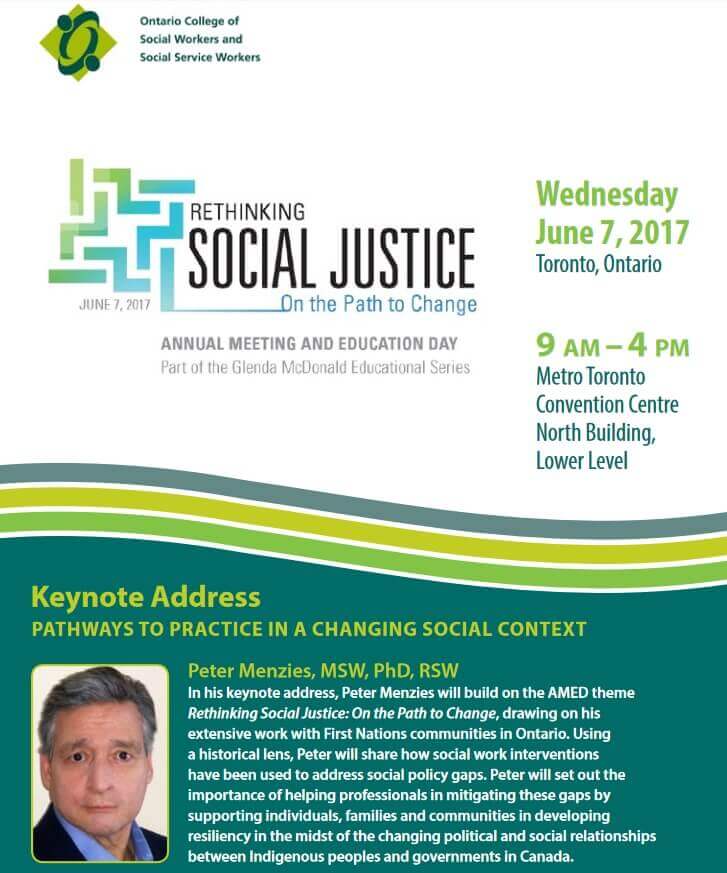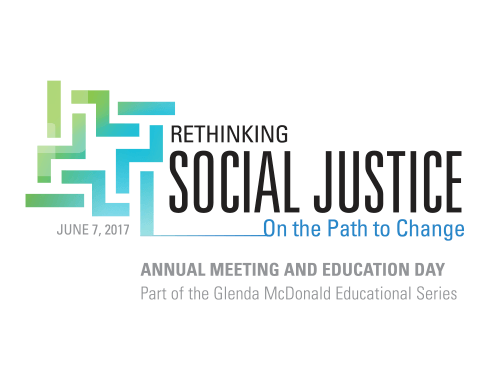Annual Meeting and Education Day Overview
8:30 – 9:00 a.m.
Registration
9:00 – 10:30 a.m.
Annual Meeting
11:00 a.m. – 12:00 p.m.
Keynote Address
12:00 – 1:30 p.m.
Lunch
1:30 – 2:30 p.m.
Breakout Sessions A
2:45 – 3:45 p.m.
Breakout Sessions B

Minister’s Welcome
The Honourable Helena Jaczek, Minister of Community and Social Services
President’s Report
Beatrice Traub-Werner, MSW, RSW
Registrar’s Report
Lise Betteridge, MSW, RSW
Auditor’s Report
Talia Rubin, Crowe Soberman LLP
Question Period
Keynote Address
Peter Menzies, MSW, PhD, RSW
Click on the following link to view the PowerPoint presentation in PDF format:
Keynote Address – Rethinking Social Justice: On the Path to Change
Afternoon Concurrent Sessions
Session A – 1:30 – 2:30 p.m.
Decision-Making and the Relationship in the Mandatory Reporting of Child Abuse and Neglect
Lea Tufford, PhD, RP, Roxanne Ramjattan, MSW, RSW and Ellen Katz, MSW, PhD, RSW
The presentation will explore decision-making factors (legal, clinician, situational, professional, relationship) related to reporting child abuse and neglect and present strategies (reporting, information, affect regulation, advocacy, resource) to maintain the relationship with the client following the report. The presentation will culminate in a video depicting a simulation of a clinical interview with a client who discloses child abuse. In the video, the interviewer demonstrates the relationship repair strategies as outlined in the presentation. Participants will receive a conceptual framework which outlines the decision-making and relationship components.
Post-Traumatic Guilt
Natalie Zlodre, MSW, RSW
For decades, the therapeutic work of post-traumatic stress disorder (PTSD) was to process fear, helplessness and horror. Recently the Diagnostic and Statistical Manual of Mental Disorders (DSM) has expanded the definition of PTSD to include guilt. Evidence-based research indicates that unprocessed and unresolved guilt are risk factors for developing and maintaining PTSD symptoms as well as compromising the healing process for clients with Complex PTSD and Developmental Trauma. Participants will learn: seven types of guilt, and; how to process conversations when the client feels guilty but is not guilty, the client has a distorted view of his/her role in a negative experience and when the client is guilty.
PowerPoint presentation not available.
A Commitment to Competent and Ethical Practice: The Revised CCP
Christina Van Sickle, MSW, RSW and Jennifer Burt-Yanoff, MSW, RSW
The College’s Professional Practice team will provide an interactive presentation on the newly revised Continuing Competence Program (CCP). The CCP is one way that the College promotes quality assurance and ethical and professional social work and social service work practice. It is also a valuable tool to assist members in identifying and tracking their learning goals. The presentation will explore the various kinds of learning activities that members might engage in as part of the program. Participants will learn the four steps required to complete the CCP, and how to use it to ensure they remain current and competent in their practice.
Afternoon Concurrent Sessions
Session B – 2:45 – 3:45 p.m.
Elder Mistreatment: What Does It Mean? How Should I Respond To It?
David Burnes, MSW, PhD, RSW
Elder mistreatment is a pervasive public health and societal problem with serious consequences. Although the scope of elder mistreatment is growing with the population of older adults, many professionals remain unclear about what constitutes elder mistreatment or how to respond to this problem in the community. This presentation will provide current knowledge about elder mistreatment, including an understanding of its meaning, prevalence, and risk factors. With fundamental principles of older adult self-determination and voluntariness in mind, this talk will also present a conceptual practice model to help social workers and social service workers think about how to assist victims of elder mistreatment. They will be asked to share their clinical insight and experience in dealing with cases of elder mistreatment within a fragmented and uncoordinated community response system.
Engaging Men and Boys in Gender-Based Violence Prevention
Todd Minerson
Drawing on over 10 years of engaging men and boys in gender-based violence prevention, Todd Minerson will explore the root causes of violence against women and girls as a means to successful strategies for engaging men and boys. How do we mobilize people in positions of privilege and power to pursue equity issues? What does it mean to be an ally? Discussion on these questions and the positive roles men can play will be covered in this interactive presentation. Todd is the Executive Director of White Ribbon, the world’s largest effort of men and boys working to end gender-based violence.
Run Like a Girl? That’s so Gay! Rethinking Anti-Gay Language Use Among Middle School Students
Steven Solomon, MSW, PhD, RSW
At school, students’ experiences with name-calling, put-downs, and teasing figure prominently. The student census of a large urban school board in Canada reported forty-one per cent of grade seven and eight students experienced name-calling or insults. Thus, it is important for social workers and social service workers to recognize that anti-gay language exists in middle schools and other locales, affecting lesbian, gay, bisexual, queer, Two-spirit (LGBTQ2S) and straight-identified students alike. Based on the presenter’s qualitative research linked to school social work practice addressing anti-homophobia, this workshop explores the prevalence of homophobic name calling in middle schools and its interlocking relationship to sexist language. While drawing on focus group research with middle school students, this workshop will offer insights and strategies for addressing anti-gay language among children and youth, for social workers and social service workers alike in varied settings.
